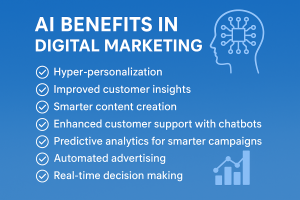Artificial Intelligence (AI) has evolved from being a futuristic concept to becoming an essential driver of business growth. In the realm of digital marketing, AI is not just a buzzword—it is a game-changer that empowers marketers to reach the right audience, at the right time, with the right message. From automation to personalization, AI is redefining how brands connect with customers.
In this blog, we’ll explore the key benefits of AI in digital marketing and why businesses can no longer afford to ignore it.
1. Hyper-Personalization
Modern consumers expect more than generic campaigns. AI enables marketers to analyze vast amounts of customer data and deliver personalized recommendations, tailored ads, and customized content.
Example: Netflix and Spotify use AI to suggest movies or songs based on user preferences.
Marketing Impact: Higher engagement rates and stronger customer loyalty.
2. Improved Customer Insights
AI tools can process large volumes of data from websites, social media, and customer interactions. This translates into deep insights about behavior, preferences, and buying patterns.
Example: Predictive analytics in e-commerce can forecast what customers are likely to purchase next.
Marketing Impact: Smarter decision-making and more effective campaigns.
3. Smarter Content Creation
AI-powered tools assist marketers in generating blogs, social media posts, product descriptions, and ad copies quickly and efficiently. While human creativity remains essential, AI provides a strong foundation to save time and maintain consistency.
Example: Tools like Jasper AI and ChatGPT help craft engaging marketing content.
Marketing Impact: Faster content turnaround and improved SEO.
4. Enhanced Customer Support with Chatbots
AI-driven chatbots and virtual assistants provide 24/7 support, answering queries instantly and improving customer satisfaction.
Example: E-commerce sites using chatbots to guide buyers through product options.
Marketing Impact: Reduced workload on support teams and faster problem resolution.

5. Predictive Analytics for Smarter Campaigns
AI enables marketers to predict future customer behavior and optimize campaigns accordingly. This helps in budget allocation, lead scoring, and anticipating demand.
Example: Predicting which email subject lines will yield higher open rates.
Marketing Impact: Reduced risk and maximized ROI.
6. Automated Advertising
AI enhances programmatic advertising by automatically bidding on ad spaces and targeting the right audience segments. This ensures cost-effective ad placements and higher conversions.
Example: Google Ads using AI to optimize campaigns.
Marketing Impact: Reduced ad spend wastage and better targeting.
7. Real-Time Decision Making
AI allows businesses to adapt instantly based on customer interactions. Whether it’s adjusting a campaign, retargeting an ad, or optimizing website design, AI provides actionable insights in real-time.
Marketing Impact: Agile and responsive marketing strategies.
8. Voice and Visual Search Optimization
With AI-driven tools, marketers can optimize content for voice assistants (like Alexa or Siri) and visual search (like Google Lens).
Marketing Impact: Expanded reach in emerging search trends and improved customer experience.
Final Thoughts
AI is not replacing marketers—it is empowering them to be more creative, strategic, and customer-focused. By automating repetitive tasks and providing data-driven insights, AI allows businesses to focus on building genuine customer relationships.
The future of digital marketing is AI-powered, data-driven, and customer-centric. Businesses that embrace AI today will not just stay competitive—they will lead the way.
???? What’s your take? How do you see AI transforming your digital marketing strategies? Share your thoughts in the comments!
